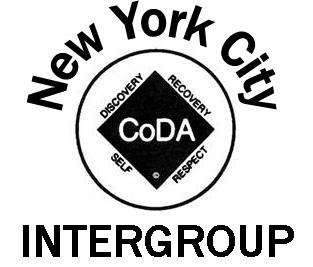 |
A Twelve Step self-help program for Co-Dependents |
| Click on a Step below to see the readings and exercises for that Step. Step 1 Step 2 Step 3 Step 4 Step 5 Step 6 Step 7 Step 8 Step 9 Step 10 Step 11 Step 12 |
CoDependents Anonymous (CoDA) in New York City This web site has been provided by NYC CoDA Intergroup Working the 12 Steps of CoDependents Anonymous (CoDA) © 2005 NYC CoDA Intergroup. All rights reserved. The CoDA 12 Steps and 12 Promises are © Co-Dependents Anonymous, Inc. The Twelve Steps and Twelve Traditions have been reprinted and adapted with permission of Alcoholics Anonymous World Services, Inc. Permission to reprint and adapt this material does not mean that AA has reviewed or approved the content of this publication, nor that AA agrees with the views expressed herein. AA is a program of recovery from alcoholism only – use of the Twelve Steps and Twelve Traditions in connection with programs and activities which are patterned after AA, but which address other problems, does not imply otherwise. Step 10 Co-Dependents Anonymous Step 10: “Continued to take personal inventory and when we were wrong promptly admitted it.” Co-Dependents Anonymous Promise 10: “I no longer need to rely solely on others to provide my sense of worth.” Suggested Reading CoDA Blue Book pp. 64-69. 12 Step Handbook: Step 10 Chapter, pages 43-49. “CoDA 12 Steps & 12 Traditions Workbook – Steps 10,11,12” : Step 10 is pages 9-11. Exercises These exercises can help you work the 10th Step. Keep the task manageable; set safe boundaries for yourself. For example, set aside an amount of time that feels comfortable to you to work the Step at a given time. Consider “book-ending” with your Step work (i.e. telling someone, or your meeting, that you plan to do something, then telling them afterwards that you did it; this can help you show up for yourself). Finally, be gentle, and remember that reading and writing about a Step are an important part of working the Steps. 1. Without editing or over-analyzing, write about “what the 10th Step means to me.” 2. Review the questions on page 11 of the “CoDA 12 Steps & 12 Traditions Workbook – Steps 10,11,12”. Use any that feel right. 3. How is this Step different from the 4th Step? Is the type of inventory different? 4. How often do you want to take personal inventory? Daily? As a “spot check” when difficult situations arise? At regularly scheduled intervals? Might this change over time? What’s right for you today? 5. Exercise – decide how your inventory will look. Will it take the form of a journal? Or a chart of assets and liabilities? Or…? What different forms occur to you? Experiment until you find your way. 6. Is it hard for you to admit when you’re wrong? Is it harder for you to admit assets or liabilities? Is it hard to remember to include yourself in your inventory? Why? 7. Exercise – make a list of your most common codependent behaviors. (Review your 4th Step inventory, or see the CoDA Book pp. 42-43 for a list.) Next, make a list of your assets, or positive behaviors. (Nurturing yourself, making a healthy boundary, affirming, commitment to health, etc.). In a journal, write a “+” on the left page and a “–” on the right. Under the “+”, briefly jot down any positive behaviors you’ve done today. Then, under the “–” briefly jot down any “wrongs” from today – wrongs to yourself and others. Refer to your lists for help, but feel free to add new ones that occur to you. Keep it simple. 8. What does “promptly” mean to you? Do you tend to procrastinate? How does it feel to act promptly when you know you are wrong versus putting it off for some later, “better” time? Can you be gentle with yourself as you consider this issue? 9. Who do you want to “admit” your wrongs to? If the wrong was against someone else, can you admit it to yourself at least? Would it help to admit this wrong to someone else? Is there an amends or change in your behavior that you can make? 10. What feelings come up about doing your Step work? Is this work something you “should” be doing or are not doing “well enough”? Do you want recognition or praise? Can you include these things in your continuing inventory? 11. Exercise – consider the motivations for some of your actions today. Were you “just being helpful” or were you care-taking, becoming someone else’s Higher Power? Were you “just giving advice” or perhaps trying to control, or assert superiority? Were you “discussing a person honestly” or just gossiping? Were you “teaching someone an important lesson” or punishing? In answering these questions, consider how you feel about each situation now, and how you felt at the time. Note especially if you feel defensive. 12. Have you allowed yourself to have fun today? What does your inner child want? Can you do something fun right now, even something simple, and then add it to your inventory? If you want to be on our email list to receive updates on upcoming CoDA events in New York City, please write to anicko2794@yahoo.com For more CoDA info, go to www.codependentsnyc.org or call 646-289-9954 For more information on the program of CoDependents Anonymous, visit the CoDA World Fellowship web site at www.coda.org |